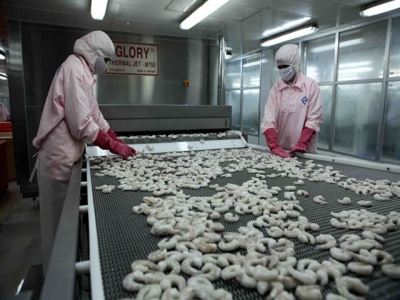Shrimp export enterprises must ensure traceability mechanism

Only using about 10% of Indian shrimp imported in a short period, Minh Phu Group Joint Stock Company (Minh Phu) has faced anti-dumping duty by the US Customs and Border Agency (CBP) for shrimp exported to the United States. Due to this incident, shrimp exporting enterprises need to implement a traceability mechanism to ensure they meet the requirements of the importing country.
Stop importing Indian shrimp from 2019
CBP initiated an investigation of the Minh Phu Group tax evasion case on October 9, 2019, based on a lawsuit filed by the US Shrimp Trade Enforcement Commission - US shrimp producers.
According to the claim of the plaintiff, although Minh Phu has activities to produce frozen shrimp originating in Vietnam, the company also imports shrimp from India for export to the US.
However, according to Minh Phu, during the investigation period (from October 1, 2018 to August 31, 2019), the amount of Indian shrimp that Minh Phu imported for use as raw materials only accounted for about 10% of the total input materials of the Group. Especially, from the beginning of 2019, Minh Phu's imported shrimp only made up a negligible amount and from the second quarter of 2019, Minh Phu no longer used imported Indian shrimp.
As soon as the CBP initiated the investigation, the Ministry of Industry and Trade worked with the Ministry of Agriculture and Rural Development, the Vietnam Association of Seafood Exporters and Producers and Minh Phu Group to clarify the situation, at the same time ensure corporate coordination, providing maximum information to the US side.
During the investigation, CBP repeatedly requested Minh Phu Group and its affiliates to provide information, documents and evidence related to the case.
However, on October 13, 2020, CPB concluded that Minh Phu Group did not provide sufficient evidence on the management and use of input materials to produce export goods as required by CBP. Therefore, this group is considered to have evaded anti-dumping measures that the US is applying to Indian shrimp. With this conclusion, Minh Phu's shrimp products exported to the US will be subject to anti-dumping tax rates like India.
According to Le Van Quang, General Director of Minh Phu, CBP's decision applies to the shrimp batches of Minh Phu Group exported to the US for the period from October 2018 to September 2019. At this stage, Indian shrimp is subject to an anti-dumping tax of 10.17%, which is also the tax rate that Minh Phu made a temporary payment at the request of CBP when initiating the investigation. Recently, the US announced that the anti-dumping tax on Indian shrimp for the period from October 2019 to September 2020 has been reduced to 3.57%.
However, since the end of July 2019, Minh Phu Group has stopped importing raw shrimp from India, so Minh Phu will not have to pay this tax. Currently, Minh Phu's lawyer in the US is working with US authorities on this issue.
Be careful about traceability
While Minh Phu is completing the dossier to appeal the CBP's decision, the Ministry of Industry and Trade is also working hard to ensure the legal interests of the Vietnamese shrimp industry.
The Ministry of Industry and Trade will continue to discuss with relevant US agencies to clarify information, ensure legal rights and interests of Vietnam's shrimp farming, processing and exporting industry.
Experts recommend that, from the above case, enterprises when exporting should research, develop and implement a traceability mechanism to ensure to meet the requirements of the importing country.
Ho Quoc Luc, Chairman of Sao Ta Food Joint Stock Company, said that riskis normal in business. CBP decided the tax rate of 10.17% for Minh Phu shrimp, but Minh Phu has the right to appeal, so this incident will be prolonged. However, through this, other businesses draw experience and focus on more carefully studying the laws of the importing country in order not to fail as mentioned above.
For Sao Ta Food Joint Stock Company, in this case CBP investigates each business separately and does not impose tax on unrelated businesses.
"Besides, Sao Ta attaches great importance to transparent activities and sustainable development, so they have not bought Indian shrimp recently," Luc said.
Tran Quoc Luc also warned that businesses that still seek benefits from importing Indian shrimp must stop. Because information on importing shrimp from India will not be hidden from the plaintiff. When they see that any business still has intentions in this matter, they will probably continue to sue.
Assessing the impact of the lawsuit on shrimp exports and shrimp farmers, Mr. Luc said that it seemed to be influenced by Minh Phu as a very large enterprise, but Minh Phu is temporarily restricted in this market can be transferred to many other markets, especially the rich Vietnamese shrimp market. That will not have a significant impact, because at the moment the end of the shrimp crop is in progress, if there is only a temporary impact and this year, shrimp exports will not be lower than last year.
Có thể bạn quan tâm
Phần mềm

Phối trộn thức ăn chăn nuôi

Pha dung dịch thủy canh

Định mức cho tôm ăn

Phối trộn phân bón NPK

Xác định tỷ lệ tôm sống

Chuyển đổi đơn vị phân bón

Xác định công suất sục khí

Chuyển đổi đơn vị tôm

Tính diện tích nhà kính

Tính thể tích ao hồ



 Long An- Earn more than 100 million dong…
Long An- Earn more than 100 million dong…  Vietnam’s crab exports to China skyrocket in first…
Vietnam’s crab exports to China skyrocket in first…